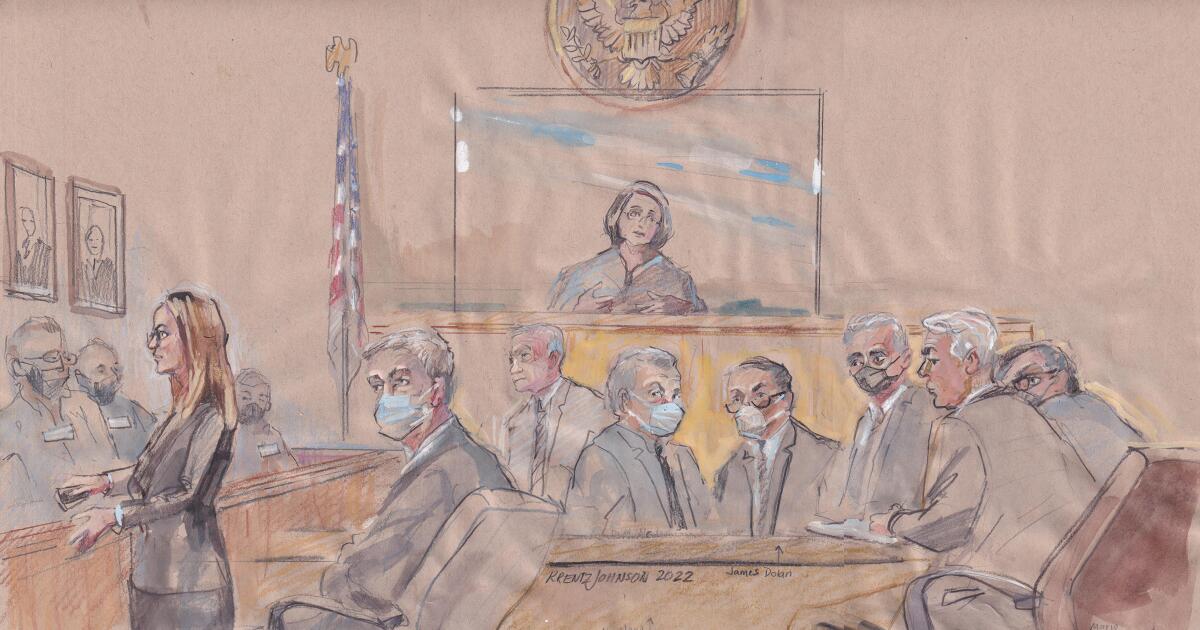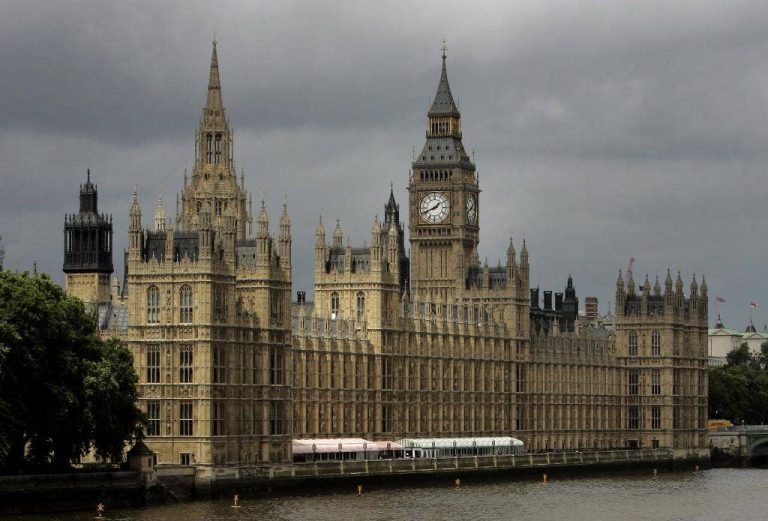
A San Diego federal judge on Wednesday declined to go forward with a hearing meant to dismiss or reduce charges against five military officers in the “Fat Leonard” scandal, providing the latest dramatic twist in the decade-old prosecution of the worst corruption scandal in U.S. Navy history, which has started to wilt under the strain of prosecutorial misconduct.
U.S. District Judge Janis Sammartino said prosecutors and defense attorneys failed to meet the legal standard for dismissing or reducing the charges because they submitted no reasoning for doing so. She said the public deserves answers about why the prosecution appears to be crumbling and said she is “concerned about the totality of this case.”
The extraordinary hearing concluded just moments before even more stunning news broke: Leonard Glenn Francis, the Malaysian military contractor and namesake at the center of the corruption and bribery scandal, had been extradited from Venezuela as part of a prisoner swap.
The Biden administration confirmed that Francis, who was captured in Venezuela weeks after fleeing from San Diego house arrest in September 2022, was one of the 36 detainees being exchanged for Colombian businessman Alex Saab, an ally of Venezuelan President Nicolás Maduro.
Francis was first arrested in 2013 in a San Diego hotel room as part of a sting operation that lured him to U.S. soil. Since that time, prosecutors have charged more than 30 people, mostly Navy officers, in connection with the scandal, racking up guilty pleas and prison sentences along the way. The government alleged that between at least 2006 and 2014, Francis showered Navy officers with gifts of fancy meals, prostitutes, high-end hotel rooms and other perks.
In exchange, the officers did his bidding, providing ship schedules for the Navy’s Seventh Fleet and steering Navy ships to ports around Southeast Asia where Francis and his company, Glenn Defense Marine Asia, could gouge the Navy on services.
Francis admitted to defrauding the Navy of at least $35 million and cooperated with the prosecution for years. But during the case’s only trial last year, he was not called to testify. And weeks before he was set to be sentenced, he fled the country.
Wednesday’s extradition and the courtroom hearing highlighted by Sammartino’s biting critique of the prosecution were the latest twists in a case that began to crumble during that trial of five officers last year. The trial was interrupted by a three-day hearing to sort out misconduct accusations against the prosecution, and the judge later ruled a prosecutor committed “flagrant misconduct” by withholding information from defense lawyers.
Then in September, after more than a year of misconduct accusations by the trial defendants against prosecutors and investigating agents, the U.S. Attorney’s Office admitted to “serious issues” with the case and prosecution errors involving evidence. The admission was made during a hearing to vacate the four trial convictions, which occurred after the government decided not to dispute the misconduct allegations. Sammartino said her conclusion based on the government’s failure to respond meant that at least some of the allegations had merit.
The four trial defendants were allowed to instead plead guilty to misdemeanor charges and avoid prison time. (A fifth defendant was not convicted at trial.)
Last week, attorneys for several of the trial defendants filed a complaint with the California State Bar against the four trial prosecutors, accusing them of several due-process violations.
All of that led up to Wednesday’s hearing, in which prosecutors were going to ask Sammartino to entirely dismiss the charges and guilty plea of former Navy Cmdr. Stephen Shedd, who was a key witness during the trial, and reduce the charges of four additional officers who never went to trial but pleaded guilty to felony charges.
But with new U.S. Attorney Tara McGrath present in the courtroom and at times consulting with her assistants who were there to argue the government’s case, Sammartino put a halt to the expected proceedings. She said federal rules of criminal cases require the parties to provide a reason for dismissing cases or reducing charges, and neither prosecutors nor defense attorneys provided her with any such reasoning.
“The record is silent,” Sammartino said. She said the “community deserves to understand what happened” and that “justice requires more information before these matters can be resolved.”
The judge, who repeated previous remarks Wednesday by describing the prosecutorial misconduct in the case as “flagrant and outrageous,” also noted that she’d previously sentenced other defendants in the case to prison terms ranging from six months to 12 years. She wondered why she should treat the five defendants involved in Wednesday’s hearing any differently.
As to Shedd, the government did address that question in its written motion to dismiss him from the indictment, highlighting his role as a trial witness against the four officers who eventually had their own convictions dismissed.
“We do not think it is fair or just for this defendant who acknowledged his guilt and testified publicly against peers of similar or greater culpability to be penalized more harshly or the same,” Assistant U.S. Attorney Peter Ko wrote in the motion filed Monday. “Considering how the other cases ended, through no fault of Shedd’s, dismissal is the only realistic way to differentiate his effort to mitigate his wrongs.”
Ko also addressed in that motion a series of letters that attorneys for three of the trial defendants had submitted earlier this month in which they called the U.S. Attorney’s Office decision to dismiss Shedd “morally and legally backwards.” Those attorneys had bashed the decision, claiming Shedd perjured himself on the witness stand at the behest of prosecutors.
Ko wrote in the motion to dismiss Shedd that those letters should be stricken from the record. “Court dockets and courtrooms are not a comment space for anyone with an opinion,” he wrote.
“The character assassination of the prosecution is over the top and unseemly,” Ko wrote in the motion. “The events at trial did not create an alternate reality. More than 25 defendants have admitted under oath that the core allegations of their conduct and involvement with Francis are true. This remains a righteous case.”
Sammartino turned those phrases around on prosecutors at Wednesday’s hearing, asking why no explanation had been given for reducing charges against other officers “if the case remains righteous.” She also said that she disagreed with the term “character assassination,” which Assistant U.S. Attorney Mark Conover also used Wednesday.
Conover stated that his office “does not agree with many” of the misconduct accusations levied against prosecutors.
Among the four defendants who had expected to plead guilty to a lesser charge Wednesday — each was set to plead to a single misdemeanor count of disclosing information “related to the processes and operations of the United States Navy” — was former Cmdr. Jose Luis Sanchez. He was charged in the same indictment as Francis and pleaded guilty nearly nine years ago — in January 2015 — to one count of bribery and one count of a bribery conspiracy. At the time, he was the highest ranking officer to plead guilty in the case.
The other three officers who were set to plead guilty to the misdemeanor charge Wednesday were part of a separate indictment. Each have previously pleaded guilty to one count of bribery of a public official and agreed to pay hefty restitution sums.
Retired Chief Warrant Officer Robert Gorsuch, who pleaded guilty in August 2021, had agreed to pay the Navy more than $45,260 in restitution.
Retired Marine Col. Enrico “Rick” DeGuzman, who pleaded guilty in September 2021, had agreed to pay nearly $67,055.
Former Navy Capt. Donald Hornbeck, who pleaded guilty in February 2022, had agreed to pay $67,830.
Attorneys for Hornbeck and Shedd declined to comment after the hearing, as did McGrath, the U.S. attorney.
Sammartino set a March hearing date for all five defendants, with the attorneys agreeing to file motions before that time explaining the reasoning behind the suggested dismissal or reduction of charges.







